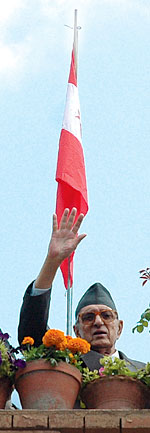|
|
For four years, the president of the NC Girija Koirala had just one demand: restoration of parliament. His party went to the supreme court, but it didn't listen and nor did the king. In the beginning, only the NWPP and the NSP (Anandadebi) supported him.
Halfway through the process, the NC-D and the UML abandoned the house restoration demand and joined the king, saying 'regression has been corrected'. It is not just because he is the senior-most leader that the seven party alliance unanimously voted Koirala for prime ministership this time. "If the NC had also gone and joined the king we wouldn't have seen a return to democracy for another 30 years," says Baldeb Sharma Majgaiya of the NC.
So the 84-year-old leader stuck stubbornly to his demand. Many said Koirala's demand will never be fulfilled but he never gave up. In fact, every opportunity he got, he advised the king repeatedly not to violate the constitution. He said once: "If I slip, I will go and live in Biratnagar but if His Majesty slips just once it will be his last slip-up."
Although he was hounded by the king, it was from his own prot?g?, Sher Bahadur Deuba, that he never got any support. The party split over the question of whether or not to extend the state of emergency. The party said no, but Deuba as prime minister refused and without consulting his party colleagues he dissolved parliament on the night of 22 May 2002. The party expelled Deuba and he set up his own NC-D.
Ever since, Koirala has been single-mindedly focussed on restoring the house that was dissolved that night. When the king took over complete power on 1 February 2005 Koirala said: "The last struggle of my life is going to be the struggle to restore democracy so that future generations will not have to keep fighting for it. All I want is a democracy that no one can take away from the people again. Then I will rest."
Sociologist Max Weber used to say there are three kinds of leaders: traditional, charismatic and legal. Koirala is a third kind, he is a 'leader of continuity'. And that is why at this juncture in history, Koirala has the support of the Maoists, the international community, other parties, civil society and even the king.
To be sure, Koirala has his kinks. He has made a lot of mistakes in the past 12 years, and even his own colleagues in the party are critical of him. He pushed a majority government through a needless mid-term poll to a minority, he refused the supreme court verdict on Tanakpur, he refused to let his own colleague Krishna Prasad Bhattarai remain as prime minister, and as president of the party he failed to keep it united. And then this week he sacked Taranath Ranabhat as speaker even though the man had served as speaker for four years while parliament was in limbo. The public perception of Koirala who has now become prime minister for the fourth time is still not very positive.
Despite all this, what Koirala will now be remembered for is his tenacity that forced the king to give in to the will of the people. Finally, parliament was restored last week. But even though he doesn't want future generations of Nepalis to have to keep on struggling for democracy, the process is still fraught with challenges. Foremost among them is the implementation of the 12-point agreement with the Maoists along the lines of the people's movement.



